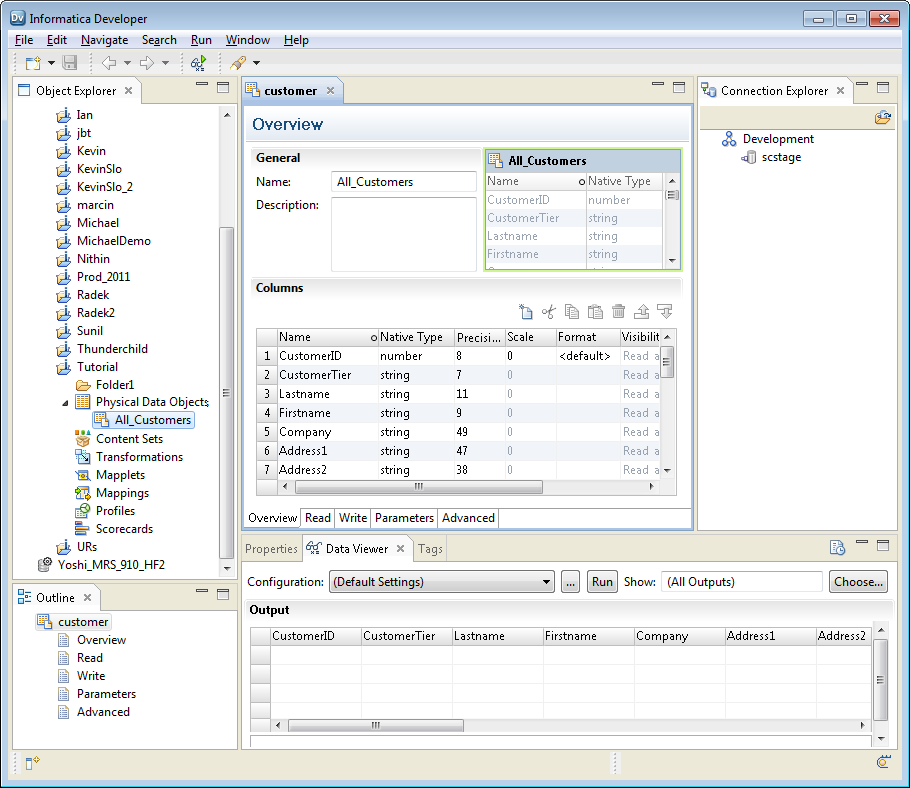Informatica Developer Overview
Informatica Developer is an application client that developers use to design and implement data solutions.
The following figure shows the Developer tool:
The Developer tool can display the following views:
- Object Explorer view
- Displays projects, folders, and the objects within the projects and folders.
- Connection Explorer view
- Displays connections to relational databases.
- Outline view
- Displays objects that are dependent on an object selected in the Object Explorer view.
- Cheat Sheets view
- Displays the cheat sheet that you open. To open a cheat sheet, click Help > Cheat Sheets and select a cheat sheet.
- Properties view
- Displays the properties for an object that is selected in the editor.
- Data Viewer view
- Displays source data, profile results, and previews the output of a transformation.
- Object Dependencies view
- Displays object dependencies when you view, modify, or delete an object.
- Alerts view
- Displays connection status alerts.
- Validation Log view
- Displays object validation errors.
The Developer tool can display other views also. You can hide views and move views to another location in the Developer tool workbench. Click Window > Show View to select the views you want to display.
Informatica Developer Welcome Page
The first time you open the Developer tool, the Welcome page appears. Use the Welcome page to learn more about the Developer tool, set up the Developer tool, and start working in the Developer tool.
The Welcome page displays the following options:
- •Overview. Click the Overview button to get an overview of data quality and data services solutions.
- •First Steps. Click the First Steps button to learn more about setting up the Developer tool and accessing Informatica Data Quality and Informatica Data Services lessons.
- •Tutorials. Click the Tutorials button to see tutorial lessons for data quality and data services solutions.
- •Web Resources. Click the Web Resources button for a link to mysupport.informatica.com, where you can access the Informatica How-To Library. The Informatica How-To Library contains articles about Informatica Data Quality, Informatica Data Services, and other Informatica products.
- •Workbench. Click the Workbench button to start working in the Developer tool.
Cheat Sheets
The Developer tool includes cheat sheets as part of the online help. A cheat sheet is a step-by-step guide that helps you complete one or more tasks in the Developer tool.
When you complete a cheat sheet, you complete the tasks and see the results. For example, after you complete a cheat sheet to import and preview a relational data object, you have imported a relational database table and previewed the data in the Developer tool.
To access cheat sheets, click Help > Cheat Sheets.
Data Quality and Profiling
Use the data quality capabilities in the Developer tool to analyze the content and structure of your data. You can enhance the data in ways that meet your business needs.
Use the Developer tool to design and run processes that achieve the following objectives:
- •Profile data. Profiling reveals the content and structure of your data. Profiling is a key step in any data project as it can identify strengths and weaknesses in your data and help you define your project plan.
- •Create scorecards to review data quality. A scorecard is a graphical representation of the quality measurements in a profile.
- •Standardize data values. Standardize data to remove errors and inconsistencies that you find when you run a profile. You can standardize variations in punctuation, formatting, and spelling. For example, you can ensure that the city, state, and ZIP code values are consistent.
- •Parse records. Parse data records to improve record structure and derive additional information from your data. You can split a single field of freeform data into fields that contain different information types. You can also add information to your records. For example, you can flag customer records as personal or business customers.
- •Validate postal addresses. Address validation evaluates and enhances the accuracy and deliverability of your postal address data. Address validation corrects errors in addresses and completes partial addresses by comparing address records against reference data from national postal carriers. Address validation can also add postal information that speeds mail delivery and reduces mail costs.
- •Find duplicate records. Duplicate record analysis compares a set of records against each other to find similar or matching values in selected data columns. You set the level of similarity that indicates a good match between field values. You can also set the relative weight fixed to each column in match calculations. For example, you can prioritize surname information over forename information.
- •Create and run data quality rules. Informatica provides pre-built rules that you can run or edit to suit your project objectives. You can create rules in the Developer tool.
- •Collaborate with Informatica users. The rules and reference data tables you add to the Model repository are available to users in the Developer tool and the Analyst tool. Users can collaborate on projects, and different users can take ownership of objects at different stages of a project.
- •Export mappings to PowerCenter. You can export mappings to PowerCenter to reuse the metadata for physical data integration or to create web services.

